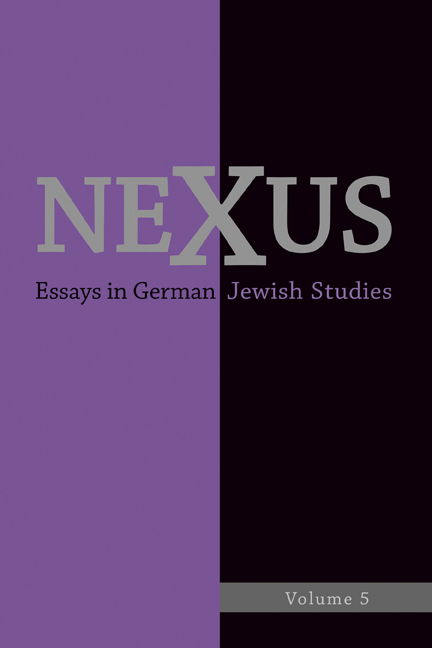 Nexus: Essays in German Jewish Studies, Volume 5
Nexus: Essays in German Jewish Studies, Volume 5 Published online by Cambridge University Press: 24 March 2021
Introduction
THE HISTORY OF TENSIONS between German and East European Jews is well-known. Many studies have dealt with the subject in one capacity or another, and it is well established in popular opinion as well. One expression of these tensions was the attitude in Germany toward the Yiddish language, something conveyed, among other things, in the ways works of Yiddish literature were transmitted to German-speaking audiences. Early attempts at such transmission and translation tended, as a matter or course and without further reflection, to rewrite the shtetl as “ghetto,” presenting it as such even when other words might show up for the term in a given translation. Hence, while the translation by Stefania Goldenring of a volume of stories by Sholem Asch (1880–1957) published in 1907 renders “shtetl” as “Städtchen,” that usage is subordinated to the volume's title Bilder aus dem Ghetto. This problem went beyond just one volume. In a series of treatments and reviews written for the Allgemeine Zeitung des Judentums Ludwig Geiger, the renowned German literary historian and sometime editor of the popular liberal journal, subsumed the works of Yiddish writers like I. L. Peretz and Sholem Aleichem as well as Sholem Asch under the genre Ghettoliteratur. Although it was a “venerated genre” in the Allgemeine Zeitung, as Hans Otto Horch notes, the Ghettoliteratur designation did not prevent Geiger from contrasting a Yiddish writer like Asch with the more esteemed English writer Israel Zangwill, and concluding: “bei Asch ist alles fremd, die Welt in der er lebt und die er beschreibt, ist eine, die wir nicht kennen und in der uns, wenn wir in sie träten, der Atem verschlägt” (with Asch, everything is foreign, the world in which he lives and which he describes, is one that we do not know and which, were we to enter it, would take our breath would be taken away). Still, one also finds attempts to challenge this image of the shtetl as ghetto and its implications for mediating Yiddish culture. Those attempts found expression in other translations from Yiddish and in other reviews of the translations and critical assessments of Yiddish writing more generally.
To save this book to your Kindle, first ensure [email protected] is added to your Approved Personal Document E-mail List under your Personal Document Settings on the Manage Your Content and Devices page of your Amazon account. Then enter the ‘name’ part of your Kindle email address below. Find out more about saving to your Kindle.
Note you can select to save to either the @free.kindle.com or @kindle.com variations. ‘@free.kindle.com’ emails are free but can only be saved to your device when it is connected to wi-fi. ‘@kindle.com’ emails can be delivered even when you are not connected to wi-fi, but note that service fees apply.
Find out more about the Kindle Personal Document Service.
To save content items to your account, please confirm that you agree to abide by our usage policies. If this is the first time you use this feature, you will be asked to authorise Cambridge Core to connect with your account. Find out more about saving content to Dropbox.
To save content items to your account, please confirm that you agree to abide by our usage policies. If this is the first time you use this feature, you will be asked to authorise Cambridge Core to connect with your account. Find out more about saving content to Google Drive.